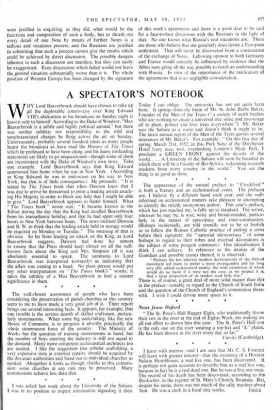A SPECTATOR'S NOTEBOOK
WHY Lord Beaverbrook should have chosen to rake up 411 the deplorable controversy over King Edward VIII's abdication in his broadcast on Sunday night is known only to himself. According to the Duke of Windsor, "Max Beaverbrook is a subtle and highly political animal," but there was neither subtlety nor responsibility in the wild and unsubstantiated charges he flung across the air on Sunday. Unfortunately, probably several hundred times as many people heard the broadcast as have read the History of The Times which he professed to have been citing, and his many misleading statements are likely to go unquestioned—though some of them are inconsistent with the Duke of Windsor's own story. Take one example. Lord Beaverbrook says that King Edward summoned him home when he was in New York. (According to King Edward he was in mid-ocean on his way to New York, but that is of little consequence.) He proceeds : " It is stated by The Times book that when Dawson knew that I was due to arrive he threatened to print a leading article attack- ing His Majesty in order to block any help that I might be able to give." Lord Beaverbrook appears to flatter himself. What "The Times book " wrote was: " It became known to the Editor during the day that the King had recalled Beaverbrook from his transatlantic holiday, and that he had spent only four hours in New York between boats. The news inclined Dawson and B. W. to think that the leading article held in storage would be required on Monday or Tuesday." The meaning of that is obvious. So far from leading an attack on the King, as Lord Beaverbrook suggests, Dawson had done his utmost to ensure that the Press should keep silence on all the well- known facts about the King and Mrs. Simpson till it was absolutely essential to speak. The summons to Lord Beaverbrook was interpreted (correctly) as indicating that the affair was coming to a head. No plain person would put any other interpretation on " The Times book's " words; it takes the subtlety of a Max Beaverbrook to find a sinister significance in them.
* * - * *










































 Previous page
Previous page